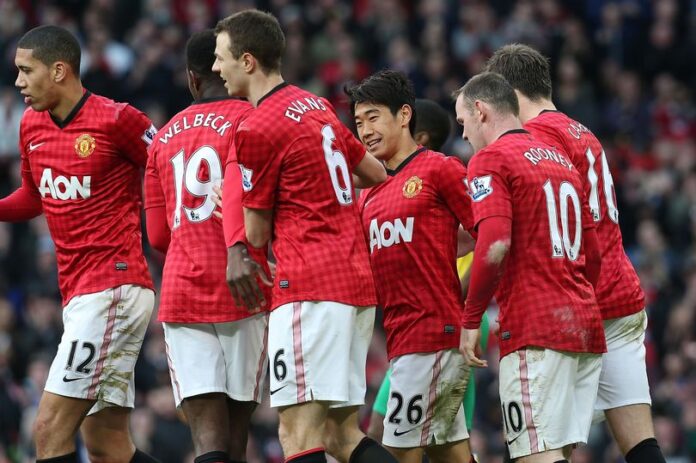“In less than two years, I had now had four managers. I joined a team that had a manager for twenty-five years before Moyes, Giggs, and Van Gaal took over.”
Although there aren’t many Manchester United players that Jurgen Klopp would gush about, things were drastically different in 2013.
With an exciting Borussia Dortmund team that had dethroned Bayern Munich, the charismatic German was making waves in his native country long before he went on to infuriate United supporters by reclaiming the red half of Merseyside.
Robert Lewandowski’s offensive prowess was a key component of that squad, but Shinji Kagawa—the quiet maestro who pulled the strings behind him—was perhaps even more influential.
Kagawa, a native of Kobe, Japan, began playing football at the age of five. He advanced through the local juvenile teams before Cerezo Osaka noticed his talent at the age of 17.
After spending four years at Cerezo, he became well-known in 2009 when he won the J League 2, his country’s second division of national football.
Dortmund was one team that saw his potential and acted quickly to trigger a €350,000 release clause in his contract, enabling him to depart the team without any questions in order to pursue a chance in Europe.
Using the money earned from Dortmund’s fifth-place finish in the Bundesliga and subsequent Europa League qualification, Klopp signed Kagawa to join players such as Lewandowski from Lech Poznan and Lukasz Piszczek from Hertha Berlin.
With Kagawa nominated in the league’s team of the season despite missing half the season due to injury, Dortmund stormed to the Bundesliga title, making it the ideal match for an exciting young manager and his exciting young team.
After recovering from an injury, Kagawa led Dortmund to a second straight title and they also set a Bundesliga record for the most points in a single season. The following season was to be even better.
His greatest moment would come in the German Cup final triumph, where he scored and helped Klopp’s team beat Bayern 5-2 to achieve an unprecedented double.
Kagawa was eager to advance in his career after winning back-to-back league titles, and his advisors had informed him that the Premier League was becoming more and more interested.
Ironically, while Arsenal and United were also expressing their views, it was Liverpool—the next team Klopp would manage—that was heavily linked to a move.
Kagawa was clear about his preference and that he wouldn’t come to Old Trafford if he wasn’t going to be playing regularly. United is still the biggest team in Japan out of all of them.
“Manchester United is bigger than Liverpool, Arsenal, and Dortmund,” was my initial thought, Kagawa said to The Athletic. “Despite being content at Dortmund, I waited for the opportunity because I truly wanted to play for Manchester United.
wished to speak with Ferguson in person. I wanted to know if Ferguson or United made the proposition and if he want me. I also asked to see where he thought I should play.
Ferguson and I met at an airport. He expressed his desires to me. Although he was hard to understand and I didn’t speak much English, the message was obvious. I had no doubts about my desire to play for United. Ferguson clarified that with me on the club, he wants to win the league again. He desired for me to win an English championship as well.
Following the excruciating pain of losing the Premier League championship to Manchester City in the final seconds of the previous year, Sir Alex Ferguson insisted that the United board respond right away.
A lot of supporters believe that it was Kagawa’s signing in the summer of 2012—shortly after Crewe native and young prospect Nick Powell—that would tip the scales back in favor of Old Trafford.
“Robin van Persie’s arrival was the biggest surprise,” he continued. “Everyone in the changing room was in awe. We knew we were good because we had terrific players, but when Robin came in, he helped everyone up. We acquired him from a major opponent, and he has been the top goal scorer in England. We were primed to win once more.
“In Manchester, the players performed better individually one-on-one. We were team players in Dortmund. It was more about individual talent in Manchester. We have some of the most well-known names on the planet. Giggs, Nani, Rooney, and Van Persie. Even though Scholes’s career was coming to an end, he remained at the top. We engaged in rondos. Scholes never lost the ball, thus he was never in the middle. Never.
Giggs was over forty years older than Scholes, but he was still quick and skilled. He carried himself with extreme professionalism. We also had Vidic, Evra, and Ferdinand. Three of the world’s greatest defenders.
Respect for Kagawa was reciprocated; the player made an impression on important members of the Old Trafford dressing room as soon as they learned that Ferguson was interested in the playmaker.
“I’m incredibly impressed. Rio Ferdinand stated, “I looked on YouTube and I’d seen him play for Dortmund on TV,” while on a preseason visit in Shanghai.
“He’s been excellent. He has excellent awareness, is quick and sharp, and plays with both feet. Playing with him and starting the season off excites me.
For the past few years, he has been among Germany’s best players. I believe he will help Manchester United maintain that form. He will be a fantastic addition, in my opinion.
However, there was initially a sense of cynicism around the £17 million signing of Kagawa, with some detractors speculating that the player had just been brought in to capitalize on the club’s big Asian market.
Then-commercial director Richard Arnold stated, “Our popularity in certain countries or regions may depend, at least in part, on fielding certain players from those countries or regions.”
“Players aren’t signed by us to promote clothes. We depend on 25 players, all of them have enormous talents. We have twenty-five George Clooneys.”
When Kagawa scored his first goal in a preseason friendly against Shanghai Shenhua, it would undoubtedly assist increase those goods sales. However, on the first day of the season, Ferguson would fully rely on the Japanese playmaker, starting him against Everton in a disappointing 1-0 loss.
The summer acquisition would start again for the club’s second home game despite the early loss, scoring his first goal in a competitive game the same day Van Persie scored his in a 3-2 victory against Fulham.
Regarding his debut, he remarked, “I was against Mousa Dembele, a very good and strong player.” “It was difficult, we prevailed 3-2, and as I was leaving the game, I wondered, ‘If it’s this difficult against the weaker teams, what can I expect from the best?'” Recall that we had previously dropped the season’s opening away match against Everton. I was playing the same role as (Marouane) Fellaini, another tremendous player. I failed to score; he did.
In addition to starting six of United’s first seven games of the new campaign, Kagawa scored twice, assisted once, and set up two vital goals in his first two Champions League appearances.
In the second game, a 3-2 victory at home against Braga, he would sustain a serious knee injury that would put a stop to his early development in Manchester and keep him out of commission for two months.
The Japan international observed how United picked up steam over the holiday season and started to exhibit tangible indicators of their approaching Premier League title triumph with victories against Arsenal, Chelsea, and City.
Though Kagawa thought he would no longer be on the club, Ferguson stuck to his word, seeing the creative potential as essential to their chances of winning the English premier league.
The midfielder was back in the starting lineup following an injury, and his professional approach to training was winning over his legendary manager.
“What really impresses me is that every workout we perform Ferguson clarified, “He’s never needed an explanation about the training ground.
One demonstration later, he jumps right in as though he’s been speaking the language for ages. We are aware that he doesn’t speak the language, of course, but it isn’t an issue.
It merely goes to demonstrate that a skilled football player can discern exactly what is required. He’s been excellent in that regard. It astonished me to hear that.
With three composed goals against Norwich at the start of March, Kagawa became the first Asian player to score a Premier League hat-trick, marking his defining moment in a United shirt.
The Japan international’s contribution to a 4-0 victory gave United an amazing 15-point advantage over rivals City. He also provided calmness to an attacking United team.
Kagawa would keep playing for United as the Premier League trophy became closer, participating in the whole of their title-winning 3-0 victory over Aston Villa.
With Kagawa a key member of that team, Ferguson delivered on his promise of winning the championship, and this time it was Van Persie who would take the hat-trick.
Although it appeared to be the beginning of something great, the title parade quickly turned into a farewell tour just two weeks later when United’s outstanding and long-serving manager announced his shocking retirement plans.
In Ferguson’s dramatic farewell game, a 5–5 draw away at West Brom, Kagawa would start and score for United while he watched his coach go after only one season together.
Like Van Persie, he was taken aback by the manager’s departure and would struggle under David Moyes’s leadership since, just a year earlier, he had been sold the dream of long-term success.
“I respected his decision, as it was his to tell us to our face,” Kagawa says. Sincerely. Given how long he had worked, I felt a little depressed. I had hoped to collaborate with him for many years, but everyone must occasionally quit.
There was a genuine feeling, shared by manager Klopp, that United hadn’t seen anything approaching Kagawa’s peak even after such a strong debut season in English football.











